
An early harvest of President Joe Biden’s efforts to enlist India to face China in the Indo-Pacific is Prime Minister Narendra Modi’s determination to prevent Sri Lanka from crashing into devastating economic collapse.
India’s resolve to support Sri Lanka by helping to alleviate its crippling foreign debt was underlined during foreign minister S. Jaishankar’s recent visit to Colombo. As part of its “Neighborhood First” policy, India is trying to save Sri Lanka from becoming a failed state like Pakistan, which is sinking into economic ruin and chaotic governance. Both are heavily indebted to China.
Modi is emerging as a leader of the Global South as divisions increase among nations in reaction to the Ukraine war and growing economic warfare between the Washington-led West and Moscow and Beijing. But his ambition of reforming the rules-based international order to strengthen democracy is competing with the authoritarian siren call and deep pockets of China’s Xi Jinping.
As the current President of G-20, the world’s 20 largest economies, India is likely to ask all of Sri Lanka’s creditors to take haircuts at a finance ministers meeting in Delhi this Friday. Beijing would have to take the largest hit because it is by far the biggest bilateral creditor.
Xi risks embarrassment because Chinese state-owned banks face massive losses on hundreds of billion dollars lent under his 2013 Belt and Road Initiative to poor countries to win influence. Just a few years later, most recipients are crippled under repayment burdens and seeking debt restructuring, relief and forgiveness.
Modi’s actions reflect engagement with Biden to find ways to compete robustly with Chinese influence in South Asia and the Indian Ocean. Stability in Sri Lanka is vitally important for preventing Chinese naval encroachment on regional sea lanes and ports, which would be major setbacks for Biden’s ambitions in the Indo-Pacific region.
India is working to prevent a new Indo-Pacific calamity with major security implications for Biden if as experts think Sri Lanka plunges into a long and deep economic recession. That could allow Beijing to secure rights to use for naval purposes the China-funded deep water Hambantota Port, on which it already has a 99-year lease.
Delhi is moving speedily to avoid having two failed states, Sri Lanka and Pakistan, crushed under Chinese debt in its neighborhood. Sri Lanka defaulted on its foreign debt in April 2022 for the first time since its creation in 1948, after being hit by an unprecedented financial crisis that triggered massive street protests.
Delhi quickly provided $4 billion in assistance at that critical moment but China, which long courted friendship with Sri Lanka by lending billions for infrastructure projects, stayed at arm’s length when the debt hobbled the economy and social unrest exploded.
Washington lost sight of Sri Lanka’s shocking crisis because of the Ukraine war but Modi stepped in, alarmed by the unprecedented intensity of protests and potential for anarchy. The situation is so dire that more than 180 prominent global economists and development experts appealed last month for debt forgiveness to prevent relapse into economic and social mayhem.
The World Bank estimated that Sri Lanka had an external debt burden of more than $52 billion in December 2022, including 40% owed to private creditors and financial institutions and the rest owed to bilateral creditors. Of the bilateral portion, 52% is owed to China, 19% to Japan and 12% to India. Delhi bears the least blame for Sri Lanka’s debt crisis but has been the first to assemble help.
The International Monetary Fund (IMF) is willing to provide a $2.9 billion bridging loan over four years, but it cannot be released without financial assurances from Sri Lanka’s major creditors.
Delhi has provided the formal assurances but Chinese lenders are still shirking partly because their loan terms are often opaque and they prefer backroom deals to transparent international restructuring. They have offered only a two-year moratorium on debt repayments and no debt forgiveness. Japan is standing alongside India.
Mass protests exploded in Colombo last April when Russia’s invasion of Ukraine thrust Sri Lanka among the top five countries with highest food price inflation and scarcity of food and medicines, exacerbated by widespread unemployment and corruption.
People stormed the presidential palace in July and were further outraged at its luxury while they were suffering deprivation. The President, Gotabaya Rajapaksa, fled the country to let tempers cool.
Ranil Wickremasinghe, a former prime minister, became the new President but he lacks the parliamentary majority needed to push sorely needed economic reforms. He cannot start the reform process without sparking more violent street protests, absent the debt relief that India is trying to accelerate.
Photo 137555601 © Butenkow | Dreamstime.com
















